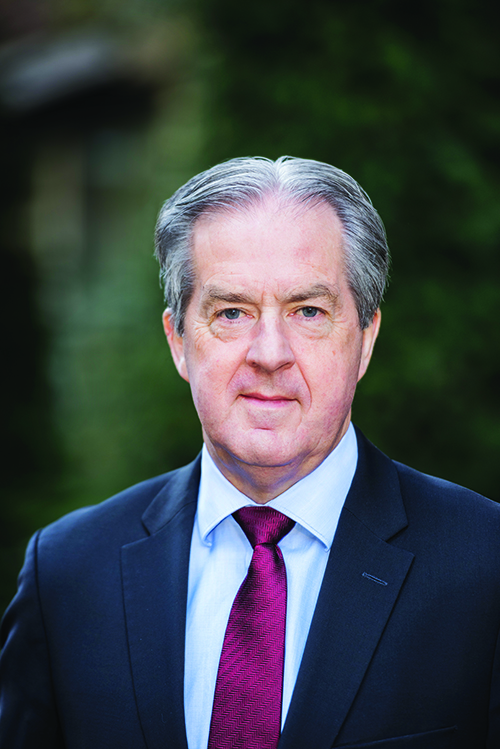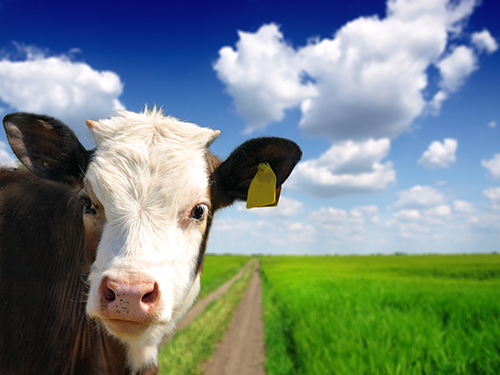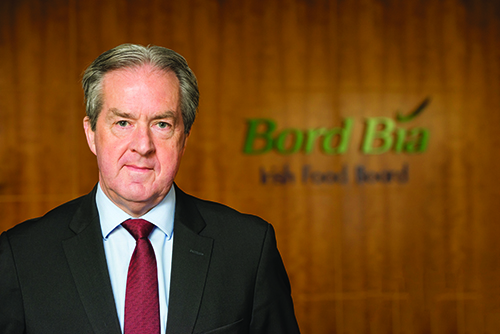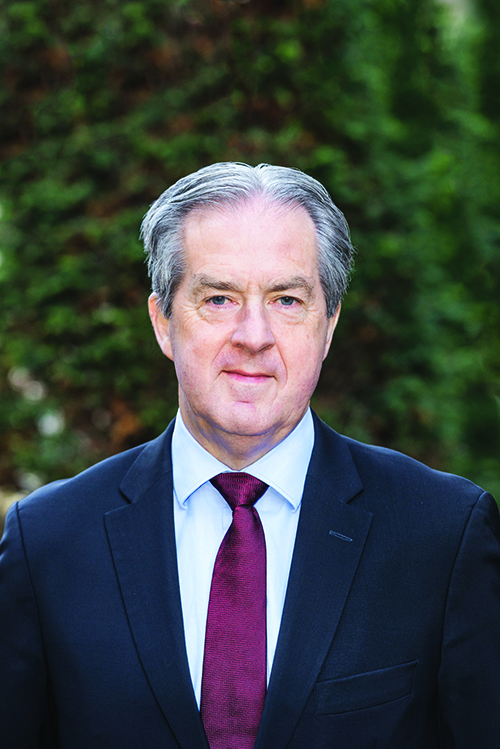Exporting for growth
 Bord Bia Chief Executive, Aidan Cotter, talks to Owen McQuade about the impressive export performance of the food and beverage sector in recent times and looks to the challenges facing the sector into the future.
Bord Bia Chief Executive, Aidan Cotter, talks to Owen McQuade about the impressive export performance of the food and beverage sector in recent times and looks to the challenges facing the sector into the future.
The food and beverage sector outperformed expectations in 2015. There were many positives within the sector that saw exports grow by 3 per cent last year to exceed €10.8 billion for the first time. “Given the very complex trading environment that the industry has been operating in this is an impressive achievement,” observes Aidan Cotter. This growth was in the context of global food commodity prices falling by as much as 19 per cent last year which was the fifth year in a row in which commodity prices fell since their last peak in April 2011. This resulted in downward pressure on food prices, making it harder for producers and processors to earn a margin. Consumer sentiment has been quite fragile in the European food and beverage market place “so all-in-all it has been very impressive”.
There have been good “strong tailwinds” behind the industry, with the weak euro, which was down by 10 per cent against sterling and 16 per cent against the dollar proving to be advantageous for Irish exports as these are currencies in which as much as 70 per cent of food and beverage exports are traded.
Although globally dairy prices have been on a very sharp downward trend the sector still managed to achieve an impressive growth rate in exports last year of 4 per cent. That was mainly down to two factors. Firstly, there has been over 13 per cent growth in milk delivery volume which indicates that the industry is on track to achieve its 50 per cent growth target by 2020.
The other factor that helped dairy exports rise was the performance of the infant formula and nutrition specialists. This sub-sector grew by 25 per cent overall in 2015 and is worth €1.15 billion. It accounts for 35 per cent of total Irish dairy exports. This is a product that is consumer ready, is high end and is servicing the most sensitive consumers in the world, infants. Cotter says that performance has been very significant in supporting dairy growth last year.
Ireland’s food and drinks industry has for the sixth consecutive year seen record export growth rates, which are now 50 per cent higher than they were in 2009. One particular highlight is the Irish beverage sector, which is going through a period of tremendous growth, with Irish whiskey leading the charge.
The beverage industry in Ireland grew by 10 per cent last year, which was driven by very strong Irish whiskey exports which increased by 18 per cent. “Whiskey is one of the most exciting of stories to be told in the beverages sector at the minute.” It is the fastest growing spirit in the world and has seen a huge development in terms of the number of distilleries in place at the present time. There has also been significant grow in the  number of craft breweries which now total 50 and 40 per cent of these are exporting. “There is now a huge dynamic in play in the beverage sector and we expect to see very significant development in the export of beverages over the next number of years,” says Cotter.
number of craft breweries which now total 50 and 40 per cent of these are exporting. “There is now a huge dynamic in play in the beverage sector and we expect to see very significant development in the export of beverages over the next number of years,” says Cotter.
“There is now a huge dynamic in play in the beverage sector and we expect to see very significant development in the export of beverages over the next number of years”
Sustainability
Underpinning the sector’s impressive growth rate is BordBia’s sustainability programme, Origin Green. The programme, which is independently verified, enables farmers and producers to set and achieve measurable sustainability targets. Origin Green formed the centre piece of Ireland’s presence at EXPO Milan, which ran from the 1 May to the end of October, and saw 2.6 million people visit the Irish exhibit to experience the impact of the Origin Green strategy.
 The feedback from the EXPO was “very positive and it was very important that we were there.” The theme of EXPO Milan ‘feeding the planet, energy for life’ which brought food sustainability into sharp focus. The world needs to expand food production by around 60 per cent over the next three and a half decades and reduce greenhouse gases by a similar amount. “I think it demonstrated that Ireland is a world leader in its approach to sustainability along the supply chain,” says Cotter.
The feedback from the EXPO was “very positive and it was very important that we were there.” The theme of EXPO Milan ‘feeding the planet, energy for life’ which brought food sustainability into sharp focus. The world needs to expand food production by around 60 per cent over the next three and a half decades and reduce greenhouse gases by a similar amount. “I think it demonstrated that Ireland is a world leader in its approach to sustainability along the supply chain,” says Cotter.
With sustainability now seen as pivotal in growing the food and beverage sector, BordBia recently published its Sustainability Report 2015. The report was published to coincide with the recent Global Sustainability Forum which was held in Dublin. The forum was hosted by BordBia, in partnership with the World Wildlife Fund (WWF) and the Sustainable Agriculture Initiative Platform. The report highlights the impressive progress that has been seen across the industry in relation to sustainability since June 2012. “It’s a comprehensive report that is rich in terms of the level of commitment and achievement of farmers and food processors on the sustainability journey. The 122 verified companies, representing over 85 per cent of exports have set themselves targets to certify their raw material sourcing, make the manufacturing process more sustainable and invest in social sustainability,” explains Cotter.
“Ireland is a world leader in its approach to sustainability along the supply chain”
Future
 Looking to the future BordBia has just published its Statement of Strategy for the next three years, entitled Making a World of Difference. The strategy sets out how BordBia will work in partnership with the industry to drive the commercial success of a world class food, drink and horticulture industry.
Looking to the future BordBia has just published its Statement of Strategy for the next three years, entitled Making a World of Difference. The strategy sets out how BordBia will work in partnership with the industry to drive the commercial success of a world class food, drink and horticulture industry.
The strategy has been devised after a consultative process with a wide range stakeholders within the industry. The strategy follows on from an evaluation of global trends of changing consumer attitudes and is built on five pillars: consumer insight, valued people, talent and infrastructure, Origin Green, effective routes to market and strong brand communication in the digital age. These five pillars will be BordBia’s strategic focus over the next three years as it helps support the industry to achieve the targets that were set in Food Wise 2025.
One initiative that will support the strategy is the establishment of a Consumer Insight Centre which will occupy the ground floor of its headquarters. It will be operational from March this year and will be a state of the art facility dedicated to “informing, learning and interacting with a global audience.”
“Success in the market place begins and ends with a deep understanding of consumers and the evolving trends worldwide,” adds Cotter.
Cotter sees understanding these trends as central to how Ireland can be “different in a global market place, enhance its returns and compete effectively.” As part of the new strategy BordBia announced plans to expand its office network in relation to targeted markets. A new Singapore office will service eight markets in South-East Asia and an office in Warsaw will cover the Eastern European region. BordBia is also reviewing its African strategy and how it covers the African continent. As part of the focus on potential opportunities in Africa, Minister Simon Coveney was on a trade mission to Nigeria and Ghana in December and BordBia sees significant opportunities in Africa over the next period as its population grows from 1 billion to 2 billion. Growth in the region is coming from countries such as Nigeria which has 185 million people at present and is expanding its population by 5 million people every year, “that’s the population of Ireland every year.”
Ultimately, Cotter believes that the future for Ireland’s food and beverage sector looks bright, however, with his pragmatic approach he knows that there will always be some “unexpected bumps along the way.”
“We are in a very volatile market,” says Cotter. “We have currencies exchange rates changing rapidly, sterling has strengthened and that is going to be challenging. We are still facing falling commodity prices and we have seen geopolitical factors damage our market place. The closure of the Russian market has had a very severe impact on our exports. There are also concerns about a global economic slowdown and that has potential to also create challenges for the industry but despite those challenges I am cautiously optimistic.”
“Success in the market place begins and ends with a deep understanding of consumers and the evolving trends worldwide”
 Aidan Cotter profile
Aidan Cotter profile
Born in Glanworth in north Cork, Aidan graduated in agriculture economics and took higher degrees in agriculture and economic science at University College Dublin. He also received an MBA from Cranfield School of Management in the UK and an honorary doctorate from UCD.
He has been in the agricultural industry since the 1980s and has spent 11 years of his career working overseas. The biggest change he has noted during his time in the industry is the increasing prevalence of technology. “It is being used in every facet of the industry and by consumers,” says Aidan. On the sector as a whole he observes: “It has become a very open and transparent industry and communication channels have certainly changed. Reaching out to consumers is increasingly important in this complex media environment. We can have a great story to tell but it is crucial that we tell it effectively.” Outside of work Aidan is a keen runner. Having ran five Dublin marathons in a row from 2008 to 2012, he now runs about four times a week. He also enjoys reading and likes to spend time in Cork where he still has the family home.





